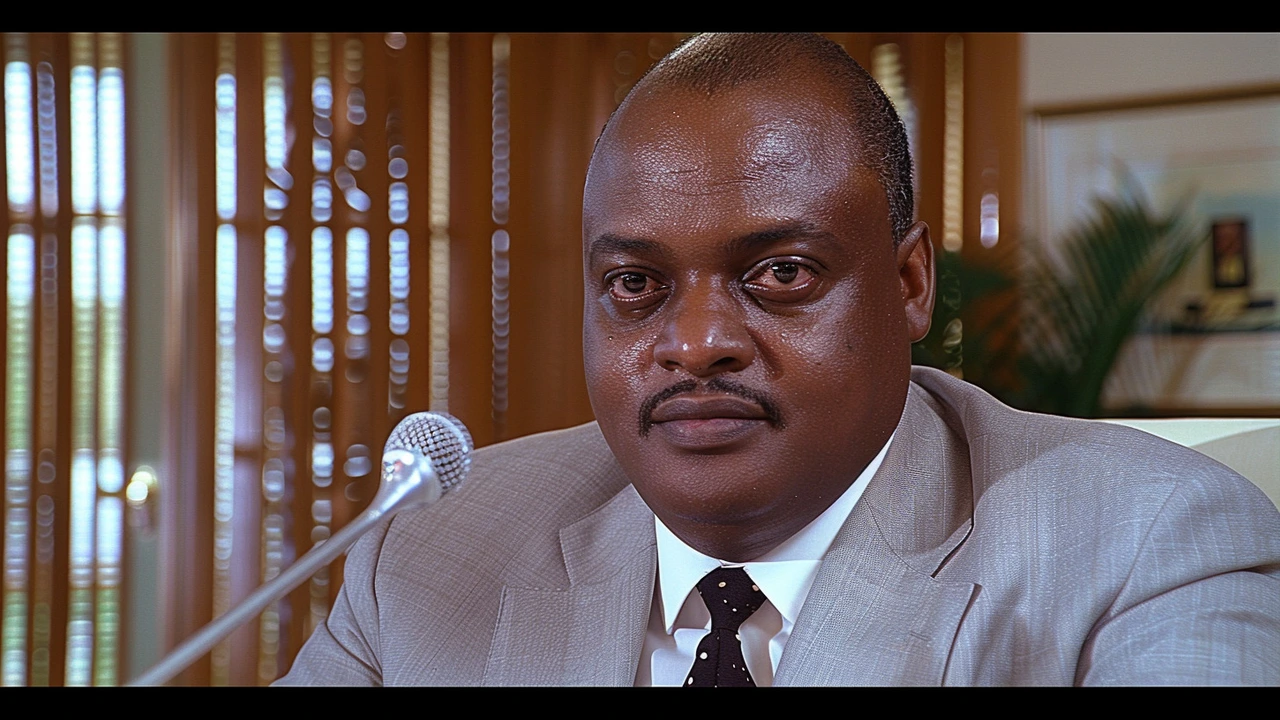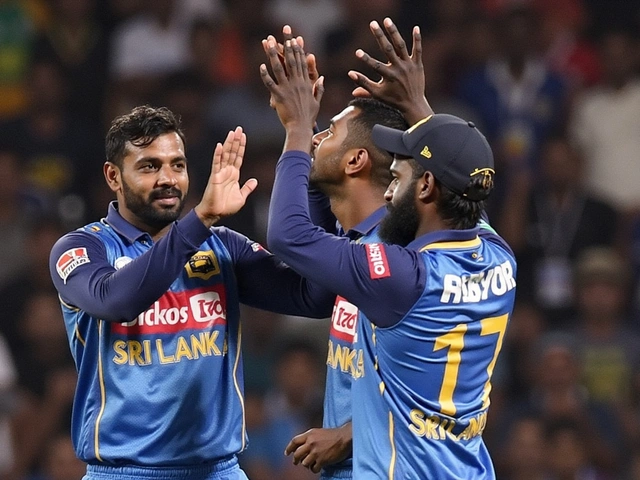Former EFCC Chairman Ibrahim Lamorde Passes Away at 61

Former EFCC Chairman Ibrahim Lamorde Passes Away at 61
In a somber turn of events, Ibrahim Lamorde, the former Chairman of Nigeria’s Economic and Financial Crimes Commission (EFCC), has died at the age of 61. Reports indicate that Lamorde passed away on Sunday while in Egypt, where he was receiving medical treatment for an undisclosed ailment. This news marks the end of a notable chapter in Nigeria’s fight against corruption, as Lamorde’s career was characterized by his significant contributions to the nation’s law enforcement and anti-corruption efforts.
Born on December 20, 1962, Lamorde joined the Nigerian Police Force in 1986, embarking on a career that would see him rise through the ranks to become Deputy Inspector General of Police (DIG) before his retirement in 2021. His journey through the police force was marked by dedication and various important roles, one of the most noteworthy being his time at the EFCC. Lamorde's tenure at the EFCC began in an acting capacity in 2011 following the removal of then-chairman Farida Waziri by then-President Goodluck Jonathan. By 2012, he was confirmed by the Senate as the third substantive chairman of the commission.
A Legacy of Anti-Corruption
Lamorde’s time at the helm of the EFCC wasn't without challenges and controversies. During his leadership from 2011 to 2015, the commission undertook numerous high-profile investigations and prosecutions aimed at curbing corruption in Nigeria. Under his stewardship, the EFCC recovered billions of dollars in stolen assets and secured numerous convictions. His unwavering commitment to fighting corruption, despite the numerous pressures and challenges, earned him both commendation and criticism in equal measure.
His tenure was noted for significant cases that captured public attention, including the trials of former state governors and influential businessmen. These cases underscored the depth of corruption within the system and the necessity of the EFCC’s role in addressing it. Lamorde’s approach was often described as proactive, and his tenure saw increased international cooperation in tackling financial crimes. However, his time at the EFCC was also marred by internal and external pressures, including allegations of mismanagement and political interference.
Service to the Nation
Lamorde’s impact extended beyond his role at the EFCC. His career in the Nigerian Police Force was equally distinguished. As a police officer, he served in various capacities, contributing to the administration of justice and the enforcement of law and order across the country. His rise to the rank of DIG was a testament to his dedication and service. Even in his policing duties, Lamorde was known for his integrity and commitment to the cause of justice. His passing is, therefore, a significant loss to the Nigerian law enforcement community.
Retiring in 2021, Lamorde left behind a legacy that continues to inspire many within and outside the EFCC. He was seen by many as a quintessential law enforcement officer, whose career was an embodiment of dedication and service to the nation. His approach to leadership was often described as disciplined and principle-driven, qualities that resonated with many of his colleagues and subordinates. In recognition of his services, Lamorde received several commendations and awards during his career, both within Nigeria and internationally.
A Personal Life Marked by Service and Dedication
Beyond his professional achievements, Lamorde was known for his humility and dedication to family. Despite his demanding career, he was a devoted family man. He leaves behind a wife and children who will undoubtedly feel the void left by his passing. To many, he was not just a public servant but also a mentor and a guide, known for his wisdom and counsel. His passing has elicited tributes from various quarters, with many reflecting on his contributions to Nigeria's law enforcement and anti-corruption efforts.
The news of his death has been met with an outpouring of grief from colleagues, friends, and admirers. Tributes have poured in from various individuals and organizations, highlighting his significant impact and the void his death has created. As Nigeria continues its fight against corruption, Lamorde’s contributions will be remembered as a pivotal part of that ongoing struggle. He leaves behind a legacy of unwavering commitment to justice and integrity, one that will inspire future generations of law enforcement officers and anti-corruption advocates.
As the nation mourns the loss of this distinguished officer, it's clear that Ibrahim Lamorde’s life and work have left an indelible mark on Nigeria’s justice system. His dedication to fighting corruption and upholding the rule of law will remain a guiding light for those who continue the fight against financial crimes in the country. In remembering Ibrahim Lamorde, it is important to acknowledge not only his accomplishments but also the values he stood for - service, integrity, and justice.






Kara Withers
May 26, 2024 AT 17:52Ibrahim Lamorde’s career offers a roadmap for anyone interested in systemic anti‑corruption work, especially his emphasis on international cooperation and asset recovery.
boy george
May 26, 2024 AT 18:52His tenure was a case study in balancing political pressure and legal rigor.
Cheryl Dixon
May 26, 2024 AT 19:52One could argue that Lamorde’s legacy is a double‑edged sword, shining brightly in its successes yet casting long shadows where controversies linger, like a kaleidoscope of ambition and compromise.
Ramesh Modi
May 26, 2024 AT 20:52Indeed! The drama of high‑profile prosecutions! The moral imperatives! The relentless pursuit of justice! All of this swirled together like a tempest of righteous fury!!!
Ghanshyam Shinde
May 26, 2024 AT 21:52Sure, because fighting corruption is always a walk in the park, right?
Charlotte Louise Brazier
May 26, 2024 AT 22:52Let’s not forget that the EFCC under his watch did crack some of the toughest cases, and that kind of aggressive action is exactly what the system needs.
SAI JENA
May 26, 2024 AT 23:52Lamorde’s dedication serves as an exemplar for future officers; may we continue to uphold those standards with the same resolve and professionalism.
Donny Evason
May 27, 2024 AT 00:52His work reminds us that cultural context and legal frameworks must intertwine, forging a resilient front against financial malfeasance.
Hariom Kumar
May 27, 2024 AT 01:52What a remarkable life – truly inspirational! 😊
Phillip Cullinane
May 27, 2024 AT 02:52Lamorde’s impact on the institutional architecture of anti‑corruption initiatives in Nigeria can be dissected through several analytical lenses. Firstly, his strategic emphasis on cross‑border asset recovery set a precedent for transnational cooperation, which aligns with the emerging paradigm of global financial integrity. Secondly, the adoption of forensic audit methodologies under his direction introduced a data‑driven rigor that heightened evidentiary standards in prosecutions. Thirdly, the operationalization of high‑profile case files created a deterrent effect, as documented in subsequent risk assessments across the region. Fourthly, his public communication strategy leveraged media engagement to shape societal narratives around accountability, thereby reinforcing normative pressures. Fifthly, internal reforms to the EFCC’s whistleblower protection mechanisms improved source reliability and reduced infiltration risks. Sixthly, the intersection of his stewardship with legislative reforms facilitated the passage of more robust anti‑money‑laundering statutes. Seventhly, the professional development programs instituted under his watch cultivated a cadre of specialized investigators, enhancing operational capacity. Eighthly, his collaborations with INTERPOL and the World Bank exemplified a multilateral approach that expanded investigative reach. Ninthly, the financial restitution mechanisms he championed contributed to the reclamation of public assets, which were subsequently re‑channeled into development projects. Tenthly, the systemic challenges he faced-such as political interference-highlighted the necessity for institutional independence, a lesson now echoed in policy briefs. Eleventhly, the legacy of his tenure continues to inform current discourse on the balance between enforcement vigor and procedural fairness. Twelfthly, academic case studies frequently cite his administration as a benchmark for effective anti‑corruption governance. Thirteenthly, the public’s perception of the EFCC’s legitimacy experienced a measurable uplift during his term, as evidenced by opinion polls. Fourteenthly, his emphasis on ethical leadership set an internal cultural tone that persists among senior officials. Finally, the cumulative effect of these initiatives underscores a transformative impact that reshaped Nigeria’s anti‑corruption landscape.
Janie Siernos
May 27, 2024 AT 03:52We must honor his commitment while also acknowledging the ethical complexities inherent in law enforcement.
joy mukherjee
May 27, 2024 AT 04:52It’s heartbreaking to lose such a dedicated public servant; my thoughts are with his family. 😊
Rob Chapman
May 27, 2024 AT 05:52Lamorde’s career illustrates how mentorship can ripple through an entire organization, fostering a culture of integrity.
Delaney Lynch
May 27, 2024 AT 06:52Indeed, the way he integrated collaborative training programs, encouraged cross‑departmental dialogues, and emphasized continuous learning truly set a standard for future leaders.
Nicholas Mangraviti
May 27, 2024 AT 07:52His legacy endures.
Jared Greenwood
May 27, 2024 AT 08:52America should study his model to strengthen our own anti‑corruption frameworks.
Sally Sparrow
May 27, 2024 AT 09:52While Lamorde achieved notable successes, the systemic issues that enabled high‑level graft remain largely unaddressed, demanding a more radical overhaul.